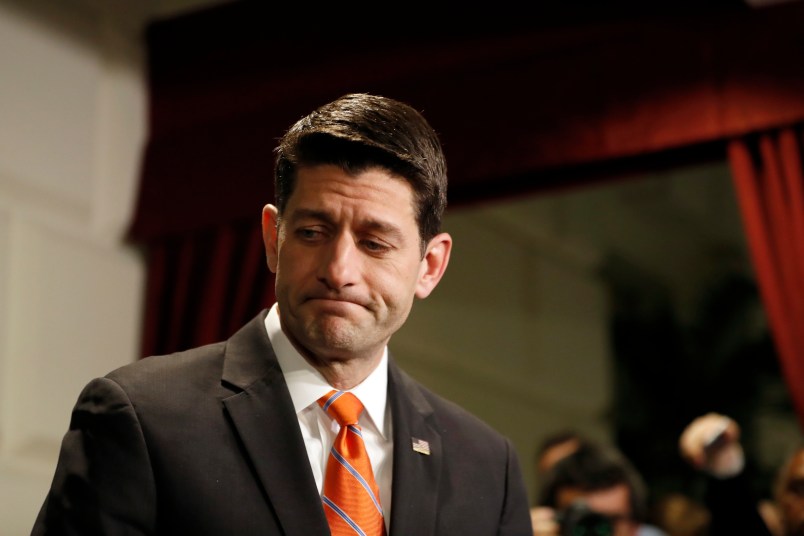Things are still extremely shaky for the GOP bill to repeal the Affordable Care Act, which is slated for a late Friday afternoon vote in the House of Representatives. An unscheduled trip by Speaker Paul Ryan to the White House to meet with President Trump suggests that even leadership isn’t sure it has the votes.
A last-minute package of amendments designed to appease both hardline conservatives and moderates has alienated some of both, and Republican leaders and the President are signaling uncertainty about the bill’s passage. The morning also saw a major defection: House Appropriations Committee Chair Rep. Rodney Frelinghuysen (R-NJ).
“Honestly, I’m not sure we’ve landed it,” Rep. Mark Walker (R-NC), the chair of the 170-member Republican Study Committee, told reporters Friday morning. “I’m hopeful we can get there today but at this point I don’t know how many we are short.”
With hours to go before the vote, and with their own and their party’s reputation on the line, Republicans were unsure who among them would back the legislation and who would oppose it.
“We will just seen where the chips fall,” Rep. Tom Cole (R-OK) told reporters.
Rep. Morgan Griffith (R-VA) was similarly noncommittal. “I have no idea,” he said when asked if the bill could pass.
Rep. Chris Collins (R-NY), a key Trump ally in Congress, said part of the problem predicting Friday’s vote result is that communications have broken down among House Republicans. “I’ve never seen this. People are refusing to talk to each other. They’re storming past each other. This is not good,” he told reporters. “There is bitterness within our conference that’s going to take time to heal.”
Over the course of the last few weeks, GOP leaders and the White House have made massive concessions the hardline Freedom Caucus—from allowing states to block-grant Medicaid to imposing work requirements on Medicaid recipients to allowing states to gut the rule that insurance plans cover 10 Essential Health Benefits.
Though leadership has also made some changes based on demands from moderates, including the allocations of an additional $15 billion dollars for maternity, mental health, and substance abuse care, the general rightward lurch of the bill has scared away some lawmakers who were on the fence and made others more confident in their opposition.
“Heck no,” Rep. Leonard Lance (R-NJ) told reporters when asked how he would vote on Friday.
Lance, who voted for the bill in committee but later came out in opposition to it, said the last-minute change of repealing Essential Health Benefits “has troubled a significant number of my colleagues.”
“I didn’t like that aspect,” he said. “That certainly didn’t help matters.”
It certainly didn’t help moderate Rep. Barbara Comstock (R-VA), who represents a swing district in suburban Virginia. Comstock had not revealed how she would vote on the health care repeal bill until early Friday afternoon, when she came out as a “hard no.”
With Democrats forming a wall of united opposition to the bill, Republicans can only afford to lose 22 votes.
Rep. Mark Amodei (R-NV), who is voting no on the bill out of concern for people in his state, which expanded Medicaid, laid out the party’s dilemma.
“I think you’re going to get some noes out of the Freedom Caucus. I think you are going to get some noes out of those 59 Republicans who were elected in Hillary-voting districts. And then you’ve got the people in the middle, which I think I kind of [am.] We don’t fit into any label. And I think you’re going to get some noes out of those. … That doesn’t require a lot of noes from each one. And there’s still water to come under the bridge. But that doesn’t seem like a monster number.”












“I have to pull the bill, Mr. President. Please don’t make me hold a failure vote.”
This bill is DOA in the Senate if it does pass the House and everyone there knows this. What difference does the House vote make other than give House Republicans a chance to either stand by or humiliate Paul Ryan?
Oh me of little faith. I was one who honestly believed repeal would pass both houses and be on Der Leader’s desk before inauguration. What I did not understand until recently is how the Trumpcare bill carries the seeds of Medicare and Medicaid destruction within it. Er… somethin’ like that. And we try to stay on top of this stuff thru the NYT, LAT and blogs.
My wife and I would be royally fucked without Medicare. My stepdaughter would be royally fucked without Obamacare because she has a life-threatening illness, could not get coverage until Obamacare.
Maybe I should get religion, go to a tent revival?
Now we gotta worry about SS. What’s a mother to do?
House GOP: Obama had a gift and he kept us united at all times. Trump is a Divider-In-Chief.
Trump: I will NEVER be BLACK.
http://www.nature.com/news/2007/071106/images/fightingrats.jpg